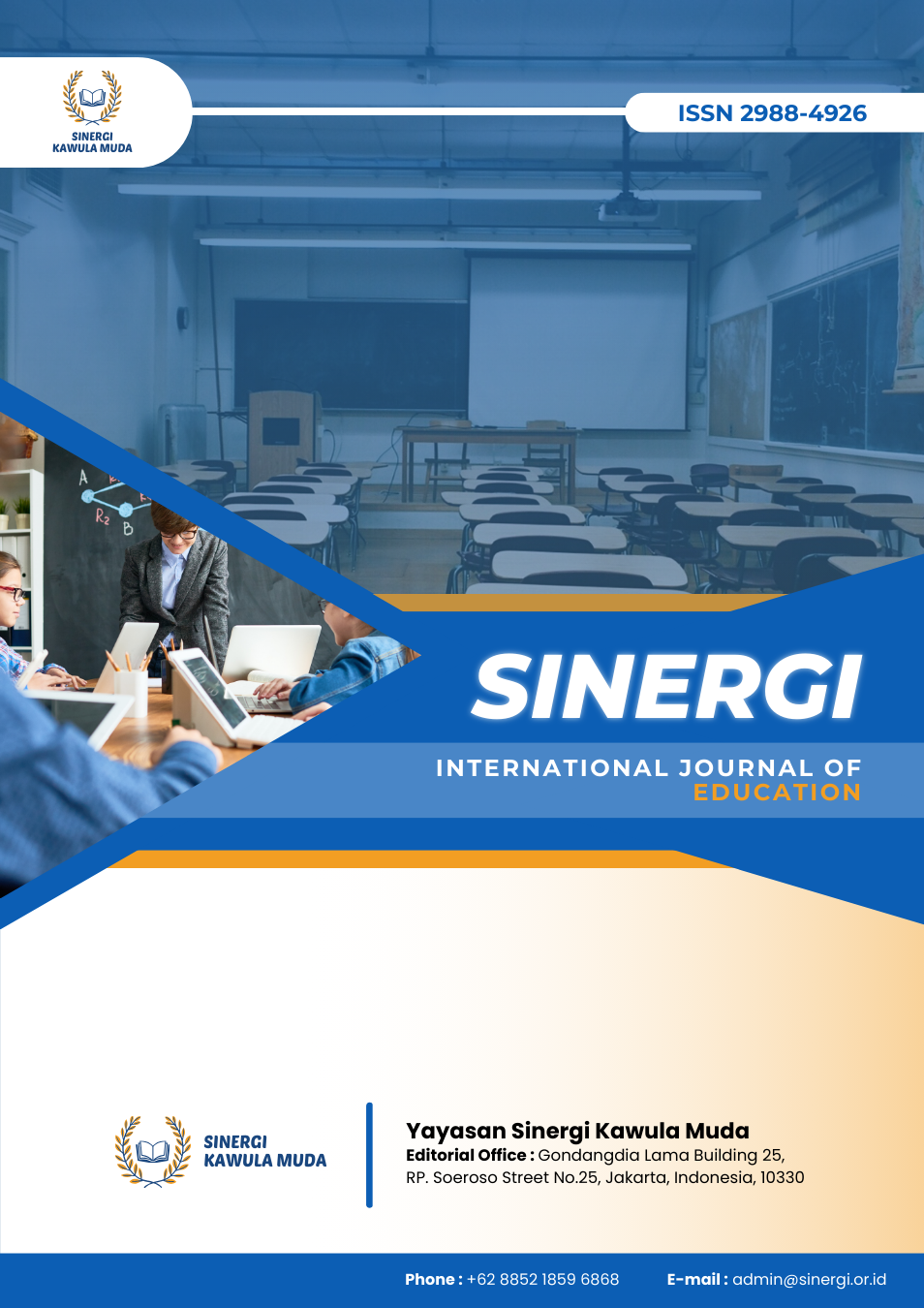Game-Based Learning for the Digital Age: A Narrative Review across Educational Levels
DOI:
https://doi.org/10.61194/education.v3i2.697Keywords:
Gamified Learning, Student Engagement, Academic Achievement, Digital Education Strategy, Educational Policy, Learning Motivation, Classroom InnovationAbstract
This narrative review investigates the effectiveness of gamification in improving student engagement and academic performance across educational levels. The study aims to explore how gamified learning environments influence cognitive, behavioral, and emotional aspects of learning. A structured narrative methodology was employed, synthesizing empirical evidence from global studies, including quantitative and qualitative data, to identify key themes and trends in gamified education. Findings indicate that gamification significantly enhances student engagement, participation, and learning outcomes through the use of points, badges, leaderboards, and real-time feedback. These elements align with classical learning theories such as behaviorism and constructivism, and when designed in accordance with self-determination principles, promote intrinsic motivation and learner autonomy. The integration of gamification is particularly effective when adapted to students' cognitive development levels, demonstrating differentiated impact across primary, secondary, and tertiary education. However, systemic challenges such as infrastructure limitations, teacher preparedness, and policy gaps hinder optimal implementation. The discussion emphasizes the need for comprehensive policy support, investment in digital infrastructure, and professional development for educators. The study concludes that gamification is a powerful pedagogical approach when applied strategically, offering a transformative path toward inclusive, interactive, and effective education.
References
Alharbi, E. and Rahman, M. (2023). A new gamification model for e-learning in Jordan higher education. https://doi.org/10.1063/5.0110791 DOI: https://doi.org/10.1063/5.0110791
Alhammad, M. and Moreno, A. (2018). Gamification in software engineering education: a systematic mapping. Journal of Systems and Software, 141, 131-150. https://doi.org/10.1016/j.jss.2018.03.065 DOI: https://doi.org/10.1016/j.jss.2018.03.065
Bayley, T., Wheatley, D., & Hurst, A. (2021). Assessing a novel problem‐based learning approach with game elements in a business analytics course. Decision Sciences Journal of Innovative Education, 19(3), 185-196. https://doi.org/10.1111/dsji.12246 DOI: https://doi.org/10.1111/dsji.12246
Buckley, P. and Doyle, E. (2014). Gamification and student motivation. Interactive Learning Environments, 24(6), 1162-1175. https://doi.org/10.1080/10494820.2014.964263 DOI: https://doi.org/10.1080/10494820.2014.964263
Chans, G. and Castro, M. (2021). Gamification as a strategy to increase motivation and engagement in higher education chemistry students. Computers, 10(10), 132. https://doi.org/10.3390/computers10100132 DOI: https://doi.org/10.3390/computers10100132
Çiğdem, H., Korkusuz, M., & KARAÇALTI, C. (2023). Gamified learning: assessing the influence of leaderboards on online formative quizzes in a computer programming course. Computer Applications in Engineering Education, 32(2). https://doi.org/10.1002/cae.22697 DOI: https://doi.org/10.1002/cae.22697
Dabbous, M., Kawtharani, A., Fahs, I., Hallal, Z., Shouman, D., Akel, M., … & Sakr, F. (2022). The role of game-based learning in experiential education: tool validation, motivation assessment, and outcomes evaluation among a sample of pharmacy students. Education Sciences, 12(7), 434. https://doi.org/10.3390/educsci12070434 DOI: https://doi.org/10.3390/educsci12070434
Dabbous, M., Sakr, F., Safwan, J., Akel, M., Malaeb, D., Rahal, M., … & Kawtharani, A. (2023). Instructional educational games in pharmacy experiential education: a quasi-experimental assessment of learning outcomes, students’ engagement and motivation. BMC Medical Education, 23(1). https://doi.org/10.1186/s12909-023-04742-y DOI: https://doi.org/10.1186/s12909-023-04742-y
Dehghanzadeh, H., Farrokhnia, M., Dehghanzadeh, H., Taghipour, K., & Noroozi, O. (2023). Using gamification to support learning in k‐12 education: a systematic literature review. British Journal of Educational Technology, 55(1), 34-70. https://doi.org/10.1111/bjet.13335 DOI: https://doi.org/10.1111/bjet.13335
Do, M., Sanford, K., Roseff, S., Hovaguimian, A., Besche, H., & Fischer, K. (2023). Gamified versus non-gamified online educational modules for teaching clinical laboratory medicine to first-year medical students at a large allopathic medical school in the United States. BMC Medical Education, 23(1). https://doi.org/10.1186/s12909-023-04951-5 DOI: https://doi.org/10.1186/s12909-023-04951-5
Fraguas‐Sánchez, A., Serrano, D., & González‐Burgos, E. (2022). Gamification tools in higher education: creation and implementation of an escape room methodology in the pharmacy classroom. Education Sciences, 12(11), 833. https://doi.org/10.3390/educsci12110833 DOI: https://doi.org/10.3390/educsci12110833
Gamarra, M., Dominguez, A., Velazquez, J., & Páez, H. (2021). A gamification strategy in engineering education—a case study on motivation and engagement. Computer Applications in Engineering Education, 30(2), 472-482. https://doi.org/10.1002/cae.22466 DOI: https://doi.org/10.1002/cae.22466
Gupta, P. and Goyal, P. (2022). Is game-based pedagogy just a fad? A self-determination theory approach to gamification in higher education. International Journal of Educational Management, 36(3), 341-356. https://doi.org/10.1108/ijem-04-2021-0126 DOI: https://doi.org/10.1108/IJEM-04-2021-0126
Hellberg, A. and Moll, J. (2023). A point with pointsification? Clarifying and separating pointsification from gamification in education. Frontiers in Education, 8. https://doi.org/10.3389/feduc.2023.1212994 DOI: https://doi.org/10.3389/feduc.2023.1212994
Hoo, W., Sundram, V., Mokhtar, A., Dzulkalnine, N., Ramdhan, N., Chhetri, P., … & Wolor, C. (2024). Gamification in supply chain education: a comparative study of supply chain card games and board games in Malaysian tertiary institutions. Edelweiss Applied Science and Technology, 8(6), 18-30. https://doi.org/10.55214/25768484.v8i6.1703 DOI: https://doi.org/10.55214/25768484.v8i6.1703
Kalogiannakis, M., Papadakis, S., & Zourmpakis, A. (2021). Gamification in science education. A systematic review of the literature. Education Sciences, 11(1), 22. https://doi.org/10.3390/educsci11010022 DOI: https://doi.org/10.3390/educsci11010022
Kim, J. and Castelli, D. (2021). Effects of gamification on behavioral change in education: a meta-analysis. International Journal of Environmental Research and Public Health, 18(7), 3550. https://doi.org/10.3390/ijerph18073550 DOI: https://doi.org/10.3390/ijerph18073550
Laksana, S., Ariyanto, A., Tajab, M., Syam, A., & Sumaryanti, L. (2024). Comic strip media assisted by digital gamification: increasing student behavior targets and user engagement in the learning process. E3S Web of Conferences, 500, 05006. https://doi.org/10.1051/e3sconf/202450005006 DOI: https://doi.org/10.1051/e3sconf/202450005006
Lan, D. and Oanh, V. (2024). Understanding educators’ hesitation to adopt tailored digital gamification. Psychological Science and Education, 29(6), 67-80. https://doi.org/10.17759/pse.2024290605 DOI: https://doi.org/10.17759/pse.2024290605
Makri, A., Vlachopoulos, D., & Martina, R. (2021). Digital escape rooms as innovative pedagogical tools in education: a systematic literature review. Sustainability, 13(8), 4587. https://doi.org/10.3390/su13084587 DOI: https://doi.org/10.3390/su13084587
Ngandu, M., Risinamhodzi, D., Dzvapatsva, G., & Matobobo, C. (2023). Capturing student interest in software engineering through gamification: a systematic literature review. Discover Education, 2(1). https://doi.org/10.1007/s44217-023-00069-4 DOI: https://doi.org/10.1007/s44217-023-00069-4
Puritat, K. (2019). Enhanced knowledge and engagement of students through the gamification concept of game elements. International Journal of Engineering Pedagogy (iJEP), 9(5), 41. https://doi.org/10.3991/ijep.v9i5.11028 DOI: https://doi.org/10.3991/ijep.v9i5.11028
Rivera, E. and Garden, C. (2021). Gamification for student engagement: a framework. Journal of Further and Higher Education, 45(7), 999-1012. https://doi.org/10.1080/0309877x.2021.1875201 DOI: https://doi.org/10.1080/0309877X.2021.1875201
Samah, L., Ismail, A., & Hasan, M. (2022). The effectiveness of gamification for students' engagement in technical and vocational education and training. International Journal of Advanced Computer Science and Applications, 13(9). https://doi.org/10.14569/ijacsa.2022.0130920 DOI: https://doi.org/10.14569/IJACSA.2022.0130920
Triantafyllou, S., Sapounidis, T., & Farhaoui, Y. (2024). Gamification and computational thinking in education: a systematic literature review. Salud Ciencia Y Tecnología - Serie De Conferencias, 3, 659. https://doi.org/10.56294/sctconf2024659 DOI: https://doi.org/10.56294/sctconf2024659
Zainuddin, Z. (2023). Integrating ease of use and affordable gamification-based instruction into a remote learning environment. Asia Pacific Education Review, 25(5), 1261-1272. https://doi.org/10.1007/s12564-023-09832-6 DOI: https://doi.org/10.1007/s12564-023-09832-6
Zeng, J., Sun, D., Looi, C., & Fan, A. (2024). Exploring the impact of gamification on students’ academic performance: a comprehensive meta‐analysis of studies from the year 2008 to 2023. British Journal of Educational Technology, 55(6), 2478-2502. https://doi.org/10.1111/bjet.13471 DOI: https://doi.org/10.1111/bjet.13471
Λαμπρόπουλος, Γ. and Sidiropoulos, A. (2024). Impact of gamification on students’ learning outcomes and academic performance: a longitudinal study comparing online, traditional, and gamified learning. Education Sciences, 14(4), 367. https://doi.org/10.3390/educsci14040367 DOI: https://doi.org/10.3390/educsci14040367






